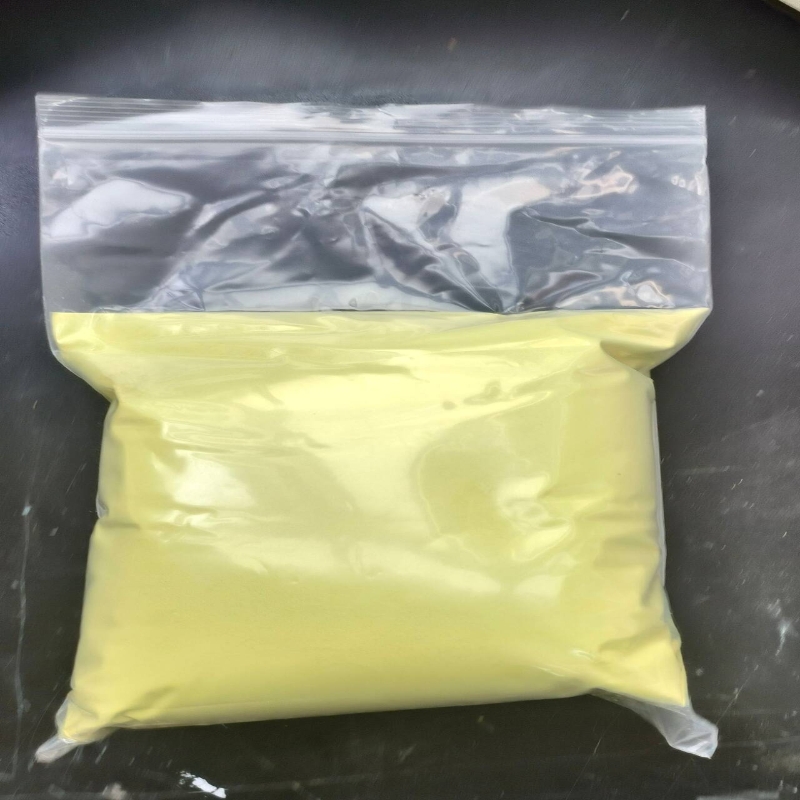BMS immunotherapy "lights up" lung cancer patients to eat "sand" to reduce blood sugar to obtain concept validation
-
Last Update: 2019-10-28
-
Source: Internet
-
Author: User
Search more information of high quality chemicals, good prices and reliable suppliers, visit
www.echemi.com
Vertex pharmaceuticals announced that the US FDA approved the company's innovative therapy trikafta (elexacaftor / tezacaftor / ivacftor and ivacftor) to be launched to treat patients over 12 years old with cystic fibrosis (CF) There was at least one f508del mutation in the CFTR gene in these patients This approval enabled 6000 patients with a f508del gene mutation and a minimal functional mutation to obtain innovative therapies targeting the pathogenesis of CF for the first time Trikfta is listed as the top 10 heavyweight drugs in 2024 by evaluatepharma The new drug application was just submitted at the end of July this year, and it took FDA less than three months to approve it! This also shows the FDA's efforts to deliver this breakthrough therapy to patients as soon as possible Trikafta is composed of three active components, of which elexacaftor is a new generation of CFTR protein corrector It is used to restore the function of CFTR protein carrying f508del mutation, so as to improve the respiratory function of CF patients Tezacaftor can enhance the function of CFTR by increasing the level of CFTR protein transport to the cell surface, while ivacaftor can improve the function of defective CFTR by prolonging the opening time of CFTR protein on the cell surface ▲ CF is caused by the abnormal function of CFTR protein, which affects the balance of water and chloride ions of cells, and eventually leads to dysfunction of lung and other organs (photo source: vertex official website) This approval is based on the positive results of two global phase 3 clinical trials for CF patients 12 years and older In the first randomized, double-blind, placebo-controlled phase 3 trial, trikafta was used to treat patients with a f508del gene mutation and a minimal functional mutation The results showed that after 4 weeks of treatment, the lung function of the patients in the treatment group was significantly improved compared with the control group The mean absolute value of forced expiratory volume per second (ppfev1) was improved by 13.8% compared with the baseline (P < 0.001) In the second phase 3 clinical trial, CF patients with two copies of f508del CFTR gene were treated with trikafta, or a combination of placebo and tezacaflor and ivacaftor The results showed that the mean absolute value of ppfev1 could be improved by 10% (P < 0.001) when elexacaftor was added into the treatment scheme composed of tezacaftor and ivacftor Seattle genetics announced that its HER2 specific oral small molecule tyrosine kinase inhibitor, tucatinib, reached the primary and secondary end points of the critical phase 2 test her2climb in the treatment of locally advanced or metastatic HER2 positive breast cancer patients Seattle genetics plans to submit a new drug application (NDA) to the U.S FDA in the first quarter of 2020 ▲ molecular structure formula of tucatinib (picture source: ed (edgar181) [public domain]) 612 patients participated in the phase 2 clinical trial named her2climb This trial is a randomized, double-blind, and active control group key clinical study It aims to compare the efficacy and safety of tucatinib combined with trastuzumab and capecitabine in the treatment of locally advanced unresectable or metastatic HER2 positive breast cancer compared with trastuzumab and capecitabine Patients in the trial have received trastuzumab, pertuzumab and ADO trastuzumab emtansine (t-dm1), and 47% of patients with brain metastasis The results showed that the combination of tcatinib and trastuzumab significantly improved the progression free survival (PFS) Compared with the combination of trastuzumab and capecitabine, it reduced the risk of disease progression or death by 46% and reached the main end point of the trial In addition, compared with the combination therapy of trastuzumab and capecitabine, the triple therapy improved the overall survival time (OS) and reduced the risk of death by 34% In patients with brain metastases, triple therapy also showed excellent PFS, reducing the risk of disease progression or death in these patients by 52%, reaching the key secondary end point of the trial Detailed data on the trial will be released at a future scientific conference BMS announced that its PD-1 inhibitor opdivo (nivolumab) and low-dose CTLA-4 inhibitor yivilmumab, combined with chemotherapy as a first-line therapy, reached the main end point of the trial in the critical phase 3 clinical trial checkmate-9la for patients with non-small cell lung cancer (NSCLC) whether PD-L1 expression or not Compared with chemotherapy, the combination therapy showed significant overall survival (OS) benefits in NSCLC patients Opdivo and yevoy are immunosuppressive checkpoint inhibitors developed by BMS Opdivo is an anti-PD-1 monoclonal antibody, while yevoy is an anti-CTLA-4 monoclonal antibody This dual checkpoint inhibitor combination therapy has been approved by the FDA for the first-line treatment of patients with moderate and high risk of advanced renal cell carcinoma, as well as patients with high MSI-H or dmmr metastatic colorectal cancer The trial, checkmate-9la, is a randomized phase 3 clinical trial designed to evaluate the efficacy and safety of opdivo in combination with low-dose yervoy and chemotherapy in the treatment of NSCLC patients with or without PD-L1 expression The trial reached the primary end point in the mid-term analysis and showed significant overall survival benefits in NSCLC patients compared to chemotherapy alone Secondary end points included progression free survival (PFS), objective response rate (ORR), and the use of biomarkers to assess efficacy in patients BMS will conduct a comprehensive assessment of the data from the trial and publish it at a future medical conference Trovagene announced that it is developing the Plk1 inhibitor onvansertib (pcm-075), in combination with FOLFIRI and Avastin (bevacizumab), as a second-line therapy, to obtain positive preliminary trial data in the phase 1B / 2 clinical trial for patients with metastatic colorectal cancer (CRC) carrying KRAS gene mutation In the analysis of the first group of patients, the decrease of mutation load level of tumor KRAS gene was observed KRAS gene mutation load is a quantitative biomarker, which reflects the total number of mutations carried by tumor cells, and can predict the response of patients to treatment Onvansertib is a "first in class" third generation oral highly selective serine / threonine polo like kinase 1 (Plk1) inhibitor Plk1 is a member of polo like kinase family, which is highly expressed in breast cancer, prostate cancer, ovarian cancer, lung cancer, rectal cancer and other solid tumors and blood cancer Plk1 is considered to be one of the cornerstones to maintain normal cell division Preclinical trials have shown that the combination of onvansertib and other therapies such as HDAC inhibitors can produce synergy, which can be used to treat leukemia and multiple solid tumors At present, onvansertib is also in clinical trials to treat metastatic castrated resistant prostate cancer (mcrpc) and refractory acute myeloid leukemia (AML) R & D plan of onvansertib (photo source: trovagene official website) This phase 1B / 2 clinical trial was designed to evaluate the efficacy and safety of onvansertib in combination with FOLFIRI and Avastin as a second-line therapy for patients with metastatic colorectal cancer with KRAS gene mutation Patients in the trial had been treated with FOLFOX alone or in combination with Avastin, but the response was poor The results showed that through the quantitative analysis of circulating tumor DNA (ctDNA), the decrease of mutation load of tumor KRAS gene was observed in the first batch of patients The US FDA announced that it approved GlaxoSmithKline's neraparib (trade name zejula) extended indications for the treatment of advanced ovarian cancer patients who have received more than three types of chemotherapy The tumors of these patients were positive for homologous recombination defect (HRD) HRD is defined as the presence of genomic instability in patients with BRCA mutations or who have progressed for more than six months after responding to platinum based chemotherapy Niraparib is an important PARP inhibitor obtained by GSK after its US $5.1 billion acquisition of tesaro last year PARP inhibitors are anticancer drugs developed on the principle of "synthetic lethality" By inhibiting PARP mediated DNA damage repair mechanism, excessive DNA damage accumulation in BRCA gene mutation bearing tumors leads to cell death Initially, PARP inhibitors were thought to work only in patients with BRCA mutations However, clinical trials conducted by Tessaro company show that PARP inhibitors can also produce therapeutic effects in tumors with defects of homologous recombination ▲ zejula's performance in different types of ovarian cancer patients in the Quadra trial (picture source: The Lancet Oncology) This approval is based on the results of an open label, single arm phase 2 clinical trial called Quadra In this trial, the researchers found that zejula was effective not only in patients with BRCA mutations (total remission rate of 29%), but also in patients without BRCA mutations, but also in patients with homologous recombination defects (total remission rate of 15%) Zejua achieved a total remission rate of 3% in patients who did not carry BRCA mutations and did not have homologous recombination defects The test results have been published in the Lancet Oncology Pliant therapeutics, a biomedical company dedicated to the development of new therapies for fibrotic diseases, announced a strategic R & D cooperation agreement with Novartis to jointly develop the α V β 1 integrin inhibitor, pin-1474, and three other candidate integrin products Pin-1474 is a preclinical candidate drug developed by pliant for the treatment of liver fibrosis caused by nonalcoholic steatohepatitis (NASH) Pliant is expected to submit its ind application to the US FDA by the end of the year Pln-1474 is an oral small molecule inhibitor that can selectively inhibit α V β 1 integrin In preclinical studies, it was found that pln-1474 could specifically inhibit α V β 1 integrin, block TGF - β activation, and reduce the growth of fibrosis tissue in the liver According to Bernard Coulie, MD, chief executive officer of pliant, the liver tissue-specific anti fibrosis effect of pln-1474 may reduce the potential risk of tolerance R & D pipeline of pliant company (photo source: pliant company website) According to the terms of the agreement, Novartis will make an advance payment of US $80 million to pliant, including its equity investment in the company Novartis will be licensed exclusively by pln-1474 worldwide and will support the development of three other candidate drugs Pliant will be responsible for the phase 1 test development of pln-1474 Thereafter, Novartis will take over and be responsible for all development, manufacturing, and commercial development Upon successful completion of the drug development, pliant is entitled to potential milestone payments, as well as a share of future sales of the drug under this joint development Sigrid therapeutics, a company dedicated to the development of innovative therapies for metabolic diseases, announced that its breakthrough therapy sipore15 had positive results in a clinical trial called star In prediabetes and newly diagnosed type 2 diabetic patients, sipore15 can significantly reduce the level of HbA1c Sipore15 is an oral therapy based on silica It won't be absorbed by the human body, but it can delay the intestinal tract
This article is an English version of an article which is originally in the Chinese language on echemi.com and is provided for information purposes only.
This website makes no representation or warranty of any kind, either expressed or implied, as to the accuracy, completeness ownership or reliability of
the article or any translations thereof. If you have any concerns or complaints relating to the article, please send an email, providing a detailed
description of the concern or complaint, to
service@echemi.com. A staff member will contact you within 5 working days. Once verified, infringing content
will be removed immediately.




![2-(Hydroxymethyl)benzo[b]thiophene](https://file.echemi.com/fileManage/upload/cas/593/e79a972f-b55d-4dc1-9113-841c417e0a89.png)


